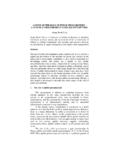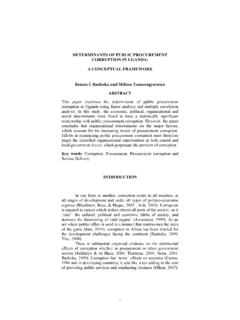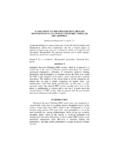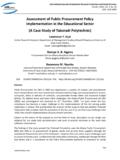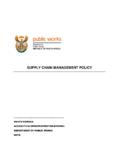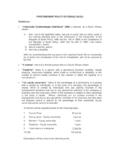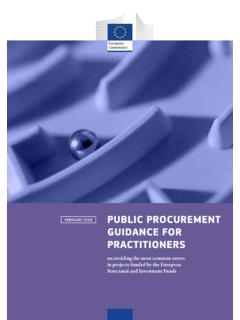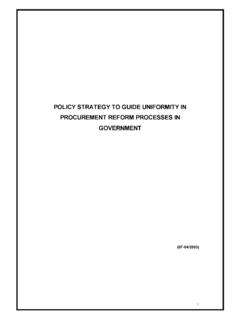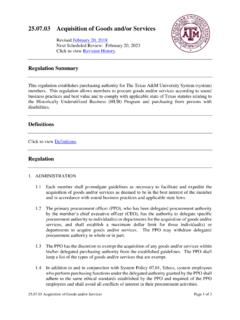Transcription of LEGISLATIVE AND ADMINISTRATIVE DIRECTIVES GOVERNING ...
1 LEGISLATIVE AND ADMINISTRATIVE DIRECTIVES GOVERNING procurement PROCEDURES: A CASE STUDY FOR SOUTH AFRICA Kishore Raga and John Derek Taylor Kishore Raga, , is a Director: School of Governmental & Social Sciences, and Principal Lecturer in the Department of Political & Governmental Studies, Nelson Mandela Metropolitan University, Port Elizabeth, South Africa. His teaching and research interests are in public sector procurement , public sector ethics and water conservation. John Derek Taylor, Prof., PhD., Senior Lecturer, in the Department of Political and Governmental Studies, Nelson Mandela Metropolitan University, Port Elizabeth, South Africa. His teaching and research interests are in developmental local government and project management. ABSTRACT To enact a comprehensive body of rules to regulate public procurement is only one element in fostering compliance with the norms and objectives of a sound public procurement programme.
2 The development of a sound legal framework is a core element in the modernisation and improvement of public procurement systems. The task of government institutions is to achieve the policy objectives which have been set by the government for community life. As public policy-maker, the government strives to establish a generally preferred future for the community. Any deliberations by the policy-maker on the establishment and realisation of such a preferred future should, of necessity, include, inter alia, the setting of standards and respect for the ADMINISTRATIVE legal framework to guide functionaries in government institutions on how to execute policy. The essence of public procurement legislation is to define and enforce those procedures that will produce a productive and efficient result, while respecting the public nature of the process and the duty of fairness to the suppliers.
3 Government institutions are not usually established with a view to profit-making, with the consequence, the objectives of their procurement function will differ considerably from the objectives of an establishment in the private sector. The efficiency objectives of the government institutions necessitate an optimal relationship from input to output, which is the same underlying motive for an efficient procurement system as is the profit motive of the organisation in the private sector. The premise for this is the raison de etre (reason for existence) of government institutions, is to pursue the general welfare of society. Furthermore, government departments can demonstrate that they have obtained the best terms available by utilising competition among suppliers who are interested in and qualified to supply the goods and services in question. In this paper, the LEGISLATIVE and ADMINISTRATIVE DIRECTIVES which impact and govern the procurement system in South Africa will be discussed.
4 INTRODUCTION A procurement official who is entirely unsympathetic with the particular needs of the users of the goods and services will fail to grasp what is one of the most essential functions for their department because they deal with papers and accounts instead of groups and individuals (Twyford, in Dobler et al, 1996:07). Government institutions are not usually established with a view to profit-making with the consequence that the objectives of their procurement management function will differ considerably from the objectives of an establishment in the private sector. The efficiency objectives of the government institutions necessitate an optimal relationship from input to output, which is the same underlying motive for an effective and efficient procurement management function as is the profit motive of the organisation in the private sector.
5 The premise for this is the raison de etre (reason for existence) of government institutions, which is to achieve, maintain and enhance the spiritual and material welfare of the inhabitants (Raga, 1997:58). The business functions of government, as controlled by the public procurement systems, affect various elements of society. Firstly, there are departments involved in the procurement functions with the responsibility to execute designated needs for the country as a whole and which require material support, for example: roads, hospitals and equipment for educational institutions. Secondly, there is the business sector of actual or potential suppliers to the government. Furthermore, there are academic, training and public interest groups which have views on how public management institutions should execute the procurement function. The largest interest group is the general public , who will express their satisfaction when they note that expenditures are being made through the public procurement system which are economical, rational and fair (Wittig, 2000:03).
6 In South Africa, a statutory body, known as the State Tender Board was established to make responsible decisions regarding the allocation of contracts to private sources for the provision of goods and services (Raga, 2002:17). The significance of such a body is clear when it is considered that government expenditure on public sector procurement alone during the 2010/2011 fiscal year exceeds R400 billion, of the total government revenue ( ). To control and account for such expenditures of taxpayer s funds, a sophisticated and responsible approach is required by both politicians and public sector officials. Legislation exists in this regard together with concomitant subordinate legislation such as regulations, consolidated instructions, procedural codes, circular letters and ADMINISTRATIVE DIRECTIVES (Raga, 2002:17-18).
7 During the Apartheid regime (separatist rule based on the colour of ones skin, prior to 1994), the Nationalist Government procurement system favoured large and established companies, which made it almost impossible for smaller and newly established enterprises from entering the procurement system. Due to the discriminatory, unfair and marginalisation practices, the majority of the South African diverse population (other than the minority whites) were purposefully prevented from accessing government contracts. Price was the decisive factor for the procurement of goods and services and tenders were awarded strictly based on price. The lowest tender in terms of price was overlooked only if there was clear evidence that the contractor did not possess experience or capacity to undertake the task or was financially insecure (Raga, 1997: 35). procurement reforms in South Africa commenced in 1995.
8 A joint initiative by the Ministries of public Works and Finance aimed at transforming public sector procurement in South Africa. The public sector procurement reforms were directed at two broad focus areas, viz.: the promotion of principles of good governance and the introduction of a preference system to address certain socio-economic goals. The procurement reform processes were supported by the introduction of a number of LEGISLATIVE and ADMINISTRATIVE measures which included, inter alia, the public Finance Management Act 1 of 1999, as amended by Act 29 of 1999 and the Preferential procurement Policy Framework Act 5 of 2000. To utilise government procurement as a tool to achieve specific socio-economic goals has been used by countries with developing economies as well as developed countries. Several governments have over decades identified socio-economic goals , for example, targeting of specific business sub-sectors (SMMEs in South Africa) as having the potential of impacting positively on structured government public sector procurement requirements (Shezi, 1998).
9 In this paper, the South African Government s utilisation of LEGISLATIVE and ADMINISTRATIVE DIRECTIVES of the procurement process to address the political imbalances of the past which denied the absolute majority (Black Africans, Coloureds and Asians) of its people from participating in the public sector procurement function. For the purpose of this article the following LEGISLATIVE DIRECTIVES will be expounded upon: Ten-Point Plan, Green Paper on public Sector procurement Reform, Constitution of the Republic of South Africa of 1996, Preferential procurement Policy Framework Act 5 of 2000, Preferential procurement Regulations of 2001, public Finance Management Amendment Act 1 of 1999 and the Supply Chain Management Policy of September 2003. A brief overview is also provided of the right to access of information as stipulated in the Constitution of 1996 and the proposed Draft Preferential procurement Regulations to target fronting.
10 POLICY INITIATIVES: 1995 / 1997 The general review of the procurement policy was to produce DIRECTIVES and procedures to accommodate the Reconstruction and Development Programme (RDP) objectives. There was also an urgent need for interim procurement strategies to be implemented immediately after the 1994 general elections within the ambit of existing legislation. The aim was for these interim interventions to impact positively on the participation of Small Medium Micro Enterprises (SMMEs), with the emphasis on the disadvantaged and marginalised sectors as well as on the creation of employment opportunities. Collectively, these interim strategies, were known as the 10-Point Plan (State Tender Board: User Manual, 1996:03-04) which will be explained briefly in the paragraphs that follow. The Plan made provision for the targeting of those persons previously disadvantaged by unfair discrimination within the emerging medium, small and micro enterprise sector by means of preference mechanisms.
